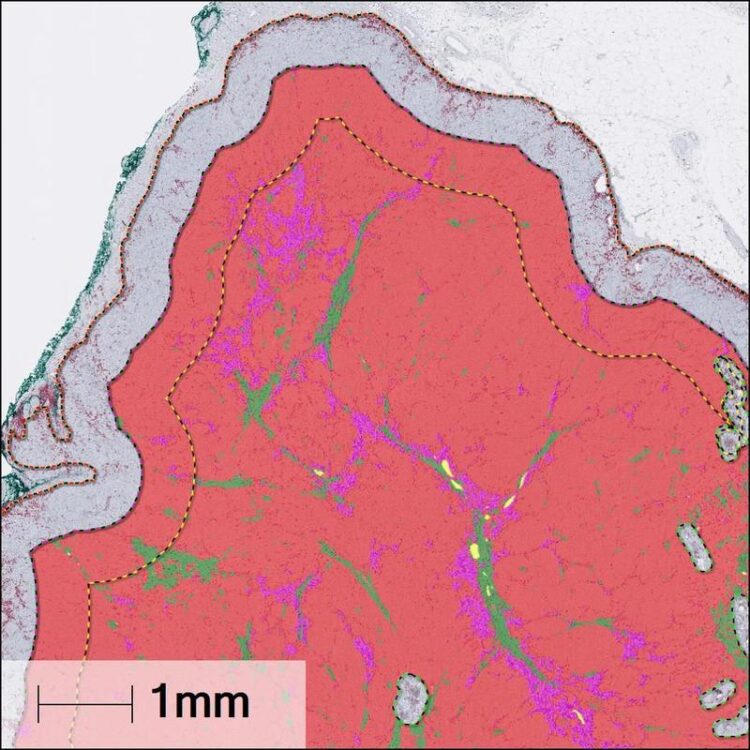Understanding and fighting tumors better with new algorithms

AI-based segmentation of melanoma metastases in a tumor
(c) USZ
The University Hospital Zurich, the University of Zurich and the diagnostics company Roche are expanding their collaboration in cancer research. In the fully digitalized Morphomolecular Pathology Laboratory, they are developing algorithms that can further improve the effectiveness of immunotherapies.
The treatment of patients with cancer has made enormous progress in recent years. A major step forward has been the development of immunotherapies, which are used with great success in some types of cancer, even at an advanced stage. However, a significant number of patients do not respond to immunotherapy. Making the effectiveness of immunotherapy available to these patients is one of the central topics of cancer research. The key to this is understanding the interaction and mutual influence of tumor and tumor environment at the cellular level, which behave individually in each patient. The University Hospital Zurich, the University of Zurich and the diagnostics company Roche have a longstanding collaboration in this research area.
The amount of CD8 T cells could determine whether the therapy works
The three partner institutions are now expanding their cooperation in the Morphomolecular Pathology Laboratory. The fully digitized laboratory continues an innovative research approach that builds on the previous collaboration in the TumorProfiler project.
In the TumorProfiler project, malignant melanomas were investigated using various molecular biological methods. The researchers focused on understanding the DNA, RNA and proteins of the individual tumor cells and their environment. In this tumor microenvironment, immune cells, including CD8 T cells, play an important role in the response to treatment. A distinction is made between tumors that have no, few or many of these CD8 T cells in their environment. The most precise possible typing and classification of tumors (tumor identity) by determining the quantity and location of these immune cells could therefore be an important factor in choosing the most effective therapy.
New algorithms train on immune cells
The Morphomolecular Pathology Laboratory aims to improve the quantitative evaluation of the immune system’s reaction against the tumor. To this end, the collaboration partners use the data generated in the TumorProfiler project to develop and train algorithms that determine the immune cells efficiently and accurately. “Our hope is that, with the help of these algorithms, we will be able to know faster and better how a patient responds to immunotherapy in the future and thus determine the most effective treatment for each individual patient,” says Prof. Dr. Viktor Kölzer, Scientific Head of the Department of Digital Pathology and Senior Physician at the Institute of Pathology and Molecular Pathology at the University Hospital Zurich and Professor of Digital Pathology at the University of Zurich.
In the Morphomolecular Pathology Laboratory, the University Hospital Zurich, the University of Zurich and Roche are working with Federated learning, an innovative approach that enables algorithms to be trained at distributed locations without compromising data security.
The collaboration marks a significant step forward in personalized cancer treatment. “Combining the expertise and resources of the three partners has proven to drive developments in digital pathology,” says Kölzer. “We are therefore confident that the Morphomolecular Pathology Laboratory will enable us to achieve significant improvements in cancer treatment.” The partners are focusing on collaboration and common goals not only in digital pathology, but also in clinical oncology. A further collaboration on personalized oncology between the University Hospital Zurich and Roche will be published shortly.
Media Contact
All latest news from the category: Medical Engineering
The development of medical equipment, products and technical procedures is characterized by high research and development costs in a variety of fields related to the study of human medicine.
innovations-report provides informative and stimulating reports and articles on topics ranging from imaging processes, cell and tissue techniques, optical techniques, implants, orthopedic aids, clinical and medical office equipment, dialysis systems and x-ray/radiation monitoring devices to endoscopy, ultrasound, surgical techniques, and dental materials.
Newest articles

A universal framework for spatial biology
SpatialData is a freely accessible tool to unify and integrate data from different omics technologies accounting for spatial information, which can provide holistic insights into health and disease. Biological processes…

How complex biological processes arise
A $20 million grant from the U.S. National Science Foundation (NSF) will support the establishment and operation of the National Synthesis Center for Emergence in the Molecular and Cellular Sciences (NCEMS) at…

Airborne single-photon lidar system achieves high-resolution 3D imaging
Compact, low-power system opens doors for photon-efficient drone and satellite-based environmental monitoring and mapping. Researchers have developed a compact and lightweight single-photon airborne lidar system that can acquire high-resolution 3D…





















